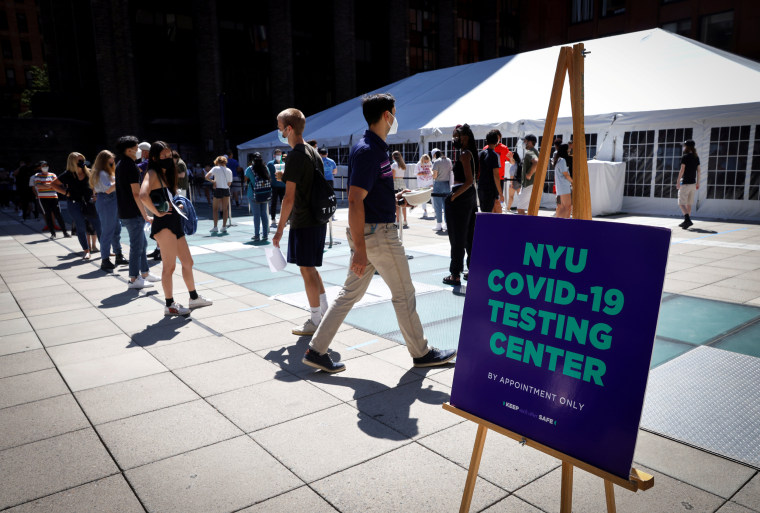The nation's leading infectious disease expert, Dr. Anthony Fauci, expressed concern Wednesday about changes to the official guidance for COVID-19 testing, which were finalized by the White House Coronavirus Task Force last week when he was undergoing surgery.
Dr. Brett Giroir, the assistant secretary for health at the Department for Health and Human Services, told reporters Wednesday that the decision to change the testing guidance came Thursday, Aug. 20, the day Fauci had surgery to remove a noncancerous polyp on his vocal cords.
Full coverage of the coronavirus outbreak
A spokesperson from the National Institute of Allergy and Infectious Disease, which Fauci leads, said that Fauci recalled "quickly reviewing a version of the guidelines" that had circulated previously. "At the time he was not struck by the potential implications of this particular change in the version he reviewed," the spokesperson said.
"Now reading them carefully, he has some concern that the revised guidelines could be interpreted as lessening the importance of asymptomatic spread of virus in the community," the spokesperson said, adding that "if people who come into close and prolonged contact with a documented case of COVID-19 become infected and are asymptomatic and are not tested and given results in a timely fashion, then asymptomatic spread to others could occur."
The guidance changed by the White House states that healthy people who have been exposed to COVID-19 "do not necessarily need a test," as long as they don't have symptoms. That's a change from previous advice that recommended testing for all close contacts of infected individuals, regardless of whether they had symptoms.
"It truly makes no sense," Dr. Leana Wen, a former Baltimore health commissioner, said. "The CDC itself estimates that 40 percent of people with coronavirus are asymptomatic. And if we are unable to identify asymptomatic individuals, we cannot stop this pandemic."
"We should be dramatically ramping up our testing capacity, not limiting the people who should be getting tests," she said.
Dr. Ashish Jha, director of the Harvard Global Health Institute, suggested the guidance was "dangerous."
"If we're not testing these people, they will infect others, and the viral transmission and outbreak will only get worse over time," he said.
The fallout over the new testing recommendations has been caught in a back-and-forth between the Centers for Disease Control and Prevention and HHS.
On Monday, the CDC quietly posted the new guidelines. When asked about the changes, CDC officials refused to answer questions, instead directing inquiries to HHS.
The department volleyed the responsibility back to the CDC on Wednesday. "Let me tell you right up front, that the new guidelines are a CDC action," Giroir said.
He later said during the same call the change was an "evidence-based decision driven by scientists and physicians" and that the White House task force members, including CDC Director Dr. Robert Redfield, Dr. Deborah Birx, and Health and Human Services Secretary Alex Azar, were involved.
"We worked on this all together to make sure that there was absolute consensus that reflected the best possible evidence and the best public health for the American people," Giroir said.
However, neither the CDC nor HHS provided any new evidence to show why less testing for COVID-19 would be beneficial to public health.
Throughout the pandemic, President Donald Trump has been outspoken about his desire to slow down testing, citing a belief that the United States has the most COVID-19 cases in the world because of the number of tests it carries out.
The CDC guidance is just that; it does not set laws or mandate testing. Each state or locality has the authority to make its own decisions of who should be tested and when.
In North Carolina, for example, the state's Department of Health and Human Services sent a letter to its physicians Wednesday, acknowledging the change in testing recommendations from the CDC, but stated it would not alter any state guidelines.
New York Gov. Andrew Cuomo also weighed in, tweeting, "This is not science. It's politics. Politics that are dangerous to public health. It's indefensible."
The Washington Department of Health, too, pushed back on the testing change, writing in a press release that "more people need to get tested at the right time if we're going to make the progress needed to find infections and stop the spread of this virus."
Download the NBC News app for full coverage of the coronavirus outbreak
Doctors on the front line acknowledged that testing people too early after an exposure could provide a false sense of security.
"Even if you get a negative test result, it doesn't get you out of quarantine," said Dr. Christopher Ohl, a professor of infectious diseases at Wake Forest Baptist Health in Winston-Salem, North Carolina. He and other public health experts encouraged people to quarantine for the full 14 days after being in close contact with an infected person.
He explained that testing people without symptoms too early might be harmful if it means they will move freely in the public without proper protection. Just because a person tests negative on day four after an exposure doesn't mean they won't develop the illness on day 10.
"It's not a Get Out of Jail Free card," Ohl said.
Follow NBC HEALTH on Twitter & Facebook.


